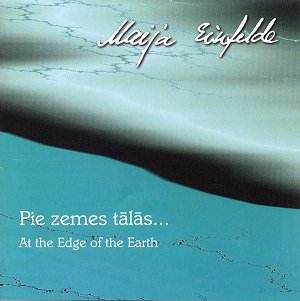This
is one of two interesting discs which have come my way from Latvian
Radio in recent weeks. This issue focuses particularly on the
works, mainly in this case of a vocal/choral nature, of Maija
Einfelde. The music must, I suppose, be placed in the context
of living through both the ravages of the Second World War and
the post-Nazi Soviet occupation, followed by the new but chaotic
freedoms after the collapse of the USSR. It must also, for that
and other reasons, be viewed alongside the compositions of contemporaries
of similar experiences, such as the deservedly ubiquitous Pärt,
Vasks and the mighty Veljo Tormis. The latter's works provide
this listener's benchmark for Baltic choral music. If you have
never heard, say, the Midsummer Songs for St. John's Eve,
then do so as a matter of urgency.
So
where does Einfelde fit in with this living tradition? I detect
a kinship, in some of the pieces, with the often angry and anguished
utterances of Vasks, a composer very much championed to great
effect by the likes of Gidon Kremer. Here you encounter a much
greater ambivalence, delicacy, femininity (unsurprisingly!) than
you may detect in the great but often quite robust offerings from
Tormis. The longest vocal piece on the disc, the opening At
the Edge of the Earth, sets texts by Aeschylus. The Greek
classical theme is revisited in the impressive Isle of the
Sirens (Homer). On all the vocal pieces, the Latvian Radio
Choir and the various permutations of its subdivisions acquit
themselves very well, as do soloists and directors. My favourite
piece and perhaps the most immediately accessible on the discs
is represented by the nostalgic but still fairly bleak My Childhood
Home. Einfelde sets the words of a compatriot poet, Vilis
Plūdons, with the choir accompanied by an usual but very
effective combination of clarinet, harp and bells. Despite a certain
diffuseness and hazy ambience, we are most certainly not in the
realm of John Tavener style certainties and affirmations. From
Antiquity is an organ piece, the alter-ego of one for four
clarinets, and is, to these ears, perhaps the least interesting
work included here. The single movement Violin and Organ Sonata,
at over sixteen minutes the longest piece, is by contrast very
interesting but also often a fairly harsh listening experience.
This mood is also the prevalent one for the setting of Psalm
15 but the CD ends on a lighter note with a luminous and plangent
Ave Maria.
All
in all, this CD is an interesting and rewarding introduction to
what was to me, a person whose love affair with the music of the
Baltic republics began with the BIS LPs of Tubin in the 1980s,
a hitherto unknown voice. Don't expect the accessibility or simplicity
of Pärt or the overt power of Tormis but there is still much
to enjoy and contemplate on. Definitely worth hearing.
Neil
Horner
